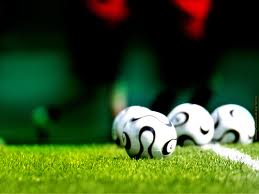
Four all — that is quite a score-line in soccer matches! In 2009, in the English Premier League, Arsenal was involved in two matches that ended four all (against their great rivals Spurs and Liverpool). The match against Liverpool see-sawed all afternoon: Arsenal led 1-0, then it was 1-1; Liverpool led 2-1 then Arsenal came back to 2-2 then went ahead 3-2 before Liverpool came back to 3-3. In the final minute Arsenal went ahead 4-3 only for Liverpool to make it 4-4 in injury time. Four all!
By Tim Middleton
It was free-flowing, exciting, end-to-end stuff, in sharp contrast to many modern matches which seem to be dominated by every player appealing for, or arguing against, every decision. To combat that, there is now talk of using VAR (Video Assistant Referee) to determine important decisions in four areas: goals and whether there was a violation during the build-up; penalty decisions; red card decisions (second yellow cards are not reviewable); mistaken identity in awarding a red or yellow card. Rules and how they are to be applied tend to dominate the discussions. Some sports seem to have far too many rules which only complicate and confuse the situation.
The fact, however, is that we need rules in sport. In fact, the reason we have rules in sport is also four-all. There are four reasons and they all have to do with all. Firstly, there are rules to ensure that the match is fun for all — if there was no touch-line, one player may think it is fun running miles away from the pitch with the ball while a player chasing after him may also think it fun but the remaining 20 players left standing without a ball while those two chase off into the distance will not find it much fun. The emphasis is on the “for all”. Secondly, there are rules to ensure it is fair for all — teams are limited to 11 players each to prevent one team playing with 20 players and another with 10. Thirdly, there are rules to ensure it is safe for all — allowing one team to play with bigger equipment will not make it safe for all. Fourthly, there are rules to ensure there is purpose for all — we have goalposts, (of the same proportions) at which teams aim to give purpose to the game, as without goal posts, players would simply be messing around. Rules make sure the sport is fun for all, fair for all, safe for all and purposeful for all. Four all is an exciting score-line!
The rules are not there to spoil the game for players but to enrich the sport for all who participate in it. The problem, though, is that when there are rules, they have to be kept. We have officials who keep them, who inspect the play to check that they are kept. It would be far better, however, if we were able to play without a referee, as often happens in “kickabouts” in the playground or streets. In the late 19th century, a soccer club by the name of Corinthians played by their own code, which included missing a penalty deliberately if they felt they were given it unfairly (for the opponents) and they would not try to save a penalty if they believed the referee was right in awarding it. They played by the spirit of the game, as opposed to the letter of the law. Interestingly, now at the International Cricket Council annual awards there is an award given for the Spirit of the Game, won recently by England vice-captain Anya Shrubsole who “displayed humility and exemplary sportsmanship” when hitting the winning runs in England’s Women’s World Cup semi-final victory over South Africa, then comforting the visibly-upset opposing captain.
All we need to understand is that “four all” applies to life as much as to sport. Four simple points should be recognised and respected. Firstly, we, and our children, need rules, not to spoil our lives but to ensure life is fun, fair, safe and purposeful for all. Secondly, however, it would be much better if we and they can self-regulate every aspect of life, not just soccer in the playground, without the need for inspectors. Thirdly, it would be best if we and they could live by the spirit of life more than by the rules of life. Fourthly, these rules are, and must be, for all; we cannot have them apply to some people and not to others. Can we imagine a soccer match where the rules only apply to some players? We cannot have life where the rules only apply to some people.
We have rules in our homes, schools, businesses and country. We have them to ensure life is fun for all, fair for all, safe for all, purposeful for all. However, it would be so much greater if we did not have millions of rules but could live by the spirit of “for all”. That would make life much more free-flowing, fun, fair, safe and purposeful! A four-all draw actually is a fair result for all!
Tim Middleton is the executive director of the Association of Trust Schools and author of the book on “failure” called Failing to Win.
- Chamisa under fire over US$120K donation
- Mavhunga puts DeMbare into Chibuku quarterfinals
- Pension funds bet on Cabora Bassa oilfields
- Councils defy govt fire tender directive
Keep Reading
email: [email protected] website: www.atschisz.co.zw











